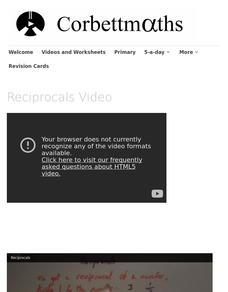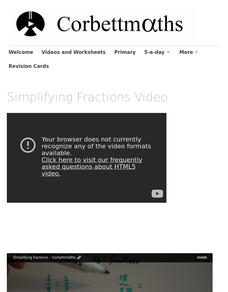TED-Ed
The Factory | Think Like A Coder, Ep 9
Here's a surefire cure to your computer programming needs. The penultimate episode of the series follows the hero as she attempts to determine a cure for a harmful compound. She must make sense of a directed graph to identify the correct...
American Museum of Natural History
They Glow!
Would you believe marine animals can make their own light? An online resource describes the process of bioluminescence and how animals in the ocean use it to survive. The lesson features a catchy tune that describes the behavior of ocean...
American Museum of Natural History
What Makes YOU YOU? What Makes ME ME?
What does DNA have to do with me? Learners watch a short animated video to learn about cells and DNA. Scholars learn that DNA is the building block of chromosomes within the cells of every living thing.
Corbett Maths
Reciprocals
Reciprocals is more than just flipping a fraction. Pupils watch a video to see how to find the reciprocal of any number. Individuals practice finding reciprocals of numbers including whole numbers and decimals.
Corbett Maths
Ordering Fractions
Put fractions in their place. An informative video shows learners how to order fractions with common denominators. The class sees a method of ordering fractions with uncommon denominators by creating equivalent fractions with a common...
Corbett Maths
Increasing or Decreasing by a Fraction of a Quantity
Calculate fractional changes in numbers. Pupils watch a short video on determining the cost of a shirt after it has been reduced by a fractional amount. Scholars use worksheets to practice calculating increased and decreased amounts.
Corbett Maths
Mixed Numbers to Improper Fractions
Mix things up a little to be improper. The presenter shows three example of changing a mixed number to an equivalent improper fraction. Scholars work several practice problems and application questions to refine the process.
TED-Ed
Can You Solve the Dragon Jousting Riddle?
Oops, you overslept! The jousting tournament among the elves, goblins, and tree folk has started, and it's your job to record the scores for each round. Since the first round of the tournament is already completed, how do you figure out...
TED-Ed
Can You Solve the Secret Sauce Riddle?
The search is on for the Pasta Palace's top chef and his recipe for a fabulous secret sauce. Viewers are challenged to figure out the hiding place of the secret recipe before agents of the Burger Bazaar and the Sausage Saloon. A...
TED-Ed
Ancient Rome’s Most Notorious Doctor
Though less famous today than Galen of Pergamon or even Dr. Frankenstein, Andreas Vesalius is revered for his discoveries that revolutionized anatomy textbooks. A short video introduces viewers to this physician who challenged Galen's...
TED-Ed
Can You Solve the Dark Matter Fuel Riddle?
Space captains must figure out how to reach an abandoned alien space station before any other species in the galaxy. The problem? Where to store caches of fuel along the way. Viewers needn't be aliens to figure out this riddle.
Corbett Maths
Simplifying Fractions
Put fractions in simpler terms. Learners watch a video showing how to simplifying fractions. They then work through two worksheets to practice the skill.
Corbett Maths
Improper Fractions to Mixed Numbers
What's the proper way to convert fractions? A short video shows three quick examples of converting an improper fraction to a mixed number. Pupils practice doing their own conversions to better understand the skill.
Corbett Maths
Multiplying Fractions
Multiply straight across. A video shows straightforward examples of multiplying fractions by multiplying the numerators and the denominators. Pupils practice the skill and give their answers as simplified fractions.
TED-Ed
Can You Solve the Unstoppable Blob Riddle?
Viewers of an entertaining short video have an opportunity to save the world! All they have to do is solve the unstoppable blob riddle. Acute learners will have no problem with this problem.
New Mexico State University
Scale Ella
Develop a sense of scale. After watching a video about scaling up and scaling down objects, the class participates in a discussion around scale factors. Pupils make a connection between scaling using division and scale factors between...
New Mexico State University
Ratey the Math Cat
Find a perfect way to recognize rates. The class first watches a video that emphasizes the word per when referencing a rate. Pupils then use their knowledge to create their own rates via station activities. Finally, individuals use...
American Museum of Natural History
Meet the Ologist: Mark Siddall
Fun fact: poisons in nature can benefit humans if they are used correctly. A video interview of a zoologist introduces the concept of poisons. The remote learning resource defines poison and provides examples in nature as well as how...
American Museum of Natural History
Meet the Ologist: Mande Holford
Questioning is the cornerstone of a good scientist. A video interview asks a biochemist about her views on topics related to poisons. She also gives advice about the qualities of a good scientist and what being a scientist has meant to...
American Museum of Natural History
Meet the Ologist: Anna Luz Porzecanski
What classifies a person as an ologist? Great as a remote learning resource, a video interview with a conservative biologist provides insight into the professional path of a scientist. The questions address both professional and personal...
PBS
Microaggressions in the Classroom
Because microaggression can be so subtle learning how to identify it and respond to it can be a challenge. Two videos from a PBS series provide examples of this form of bias and offer suggestions for how to respond in productive ways.
PBS
Microassaults, Microinsults, and Microinvalidations
Types of microaggressions are discussion in three short PBS videos: microassaults (overt intentional discrimination), microinsults, and microinvalidations. The terms are defined and examples are provided that illustrate each type of...
PBS
Frameworks for Addressing Ethical Issues
Before launching into a discussion of ethics, it's essential that common ground is established so that all participants are talking the same language. A series of five videos provides definitions and examples of the terms key to the...
PBS
Who, Me? Biased?
Introduce a discussion of implicit bias with six short PBS videos that differentiate between explicit and implicit bias. The series offers suggestions for how to recognize and change biased behaviors.

























